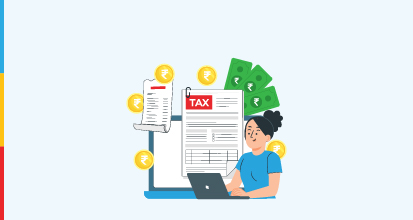2024-08-02
891 Views
6 minutes read
Share
Income tax is one of the largest sources of income for India’s government and plays an integral role in dictating the behaviour of the country’s economy as well as in the development of its infrastructure and human resources. The Income Tax Act of 1961, the Finance Act of 2025 and the Union Budget are the main sources of information consulted by individuals and organizations in determining how their income is subject to taxation.
As per the 1961 act, all those with an annual salary or income exceeding ₹5 lakh are subject to taxation while the Union Budget of 2020 revised this figure to₹4 lakh. As per the new regulations, the tax rates range from 5% of income for those with an annual income greater than₹4 lakh to 30% for those earning ₹24 lakh and above. This can be a problem for certain individuals as a large portion of their income will be lost in taxes. Fortunately, there are measures to reduce your taxable income legally to a more agreeable amount. The most common method of reducing taxable income under Sections 80C and 80CCD of the Income Tax Act of 1961, is through investing in tax saving instruments which are often among the best taxing saving measures for salaried individuals.
The maximum deductions under this section is capped at ₹1.5 lakh subject to a variety of terms and conditions. A combination of these may provide the best tax saving option for your needs, provided you meet the criteria required to claim deductions.
Click here to read - How to Save Tax?
An OTP has been sent to your mobile number

Sorry! No records Found
Thank you for your interest in our product. Our financial expert will connect with you shortly to help you choose the best plan.
Additionally, there are more deductions that can be availed as per the other sections of the Income Tax Act in addition to the deductions under 80C.
Deductions on health insurance premiums can be availed for amounts of up to Rs. 25,000 for an individual, their spouse and dependent children. Mediclaims for parents can also be deducted upto Rs. 25,000 and this amount rises to Rs. 50,000 if they are senior citizens. Additional deductions can be made if any of the dependents suffer from certain diseases or disabilities subject to conditions.
Interest on education loan repayment is deductible from an individual’s gross taxable income under this section, provided that the loans are solicited to fund the education of the individual themselves, their spouse or dependent children. The deduction is applicable for up to 8 years or until the repayment of the loan in full, whichever comes first.
A deduction of up to Rs. 50,000 can be claimed on interest on home loans for first time purchases of property under Section 80EE. This deduction is applicable only if the loan amount did not exceed Rs. 35 lakhs, was taken between from a financial institution and was for purchase of a property whose value does not exceed Rs. 50 lakhs. Conversely, a deduction of up to Rs. 1.5 lakh is applicable under Section 80EEA if the loan was sanctioned between April 1st 2016 and March 31st 2022, from a financial institution for purchase of a residence whose value did not exceed ₹50 lakh.
Contributions to relief funds or charitable organisations can be 50-100% tax deductible under Section 80G, provided that the donor is able to furnish receipts, address, PAN, registration number of the trust, name of the donor and amount donated. This deduction is also subject to other conditions under the Act. Moreover, cash donations exceeding Rs. 2,000 are not applicable
Those living in rented accommodation with no House Rent Allowance are eligible for deductions of ₹5,000 per month or ₹60,000 per year, 25% of income or rent payments exceeding 10% of total income- whichever is lowest. This is only applicable if the concerned party does not their own any other property in the city where they are living under their spouse’s, minor children’s or own name. In case they own property in another city, it should not be judged as self-occupied.
Also Read - Section 80GG
Deductions of up to Rs. 10,000 can be claimed on interest generated on savings accounts in banks or post offices by those under the age of 60.
Those residing in rented accomodation, away from self owned property are eligible for House Rent Allowance of either 40-50% of actual rent paid , or rental amounts exceeding 10% of salary/income- whichever is least.
Deductions are granted on travel expenses during leaves of absence from employment subject to conditions and submission of proof of expenditure. Additionally the deductions are only applicable for an upper limit of two domestic journeys over a period of four years.
While there exist a multitude of deductions on investments that can be claimed by individuals to ease the burden of taxation on their incomes, it is vital to understand the criteria required for eligibility before factoring them into calculations. Additionally filing certain claims could make you ineligible for others that may have a more pronounced effect in lowering your taxable income. Hence a carefully crafted combination of deductions would be the ideal approach to finding the best taxing-saving options for your needs. For example opting for the Invest 4G term plan from Canara HSBC Life Insurance allows for tax deductions on premiums as per Section 80C of the Income Tax Act of 1961.
Disclaimer - This article is issued in the general public interest and meant for general information purposes only. The views expressed in this blog are solely those of the writer and do not necessarily reflect the official policy or position of Canara HSBC Life Insurance Company Limited or any affiliated entity. We make no representations or warranties of any kind, express or implied, about the completeness, accuracy, reliability, suitability, or availability with respect to the blog or the information, products, services, or related graphics contained in the blog for any purpose. Any reliance you place on such information is therefore strictly at your own risk. You should consult with a qualified professional regarding your specific circumstances before taking any action based on the content provided herein.
We bring you a collection of popular Canara HSBC life insurance plans. Forget the dusty brochures and endless offline visits! Dive into the features of our top-selling online insurance plans and buy the one that meets your goals and requirements. You and your wallet will be thankful in the future as we brighten up your financial future with these plans.








